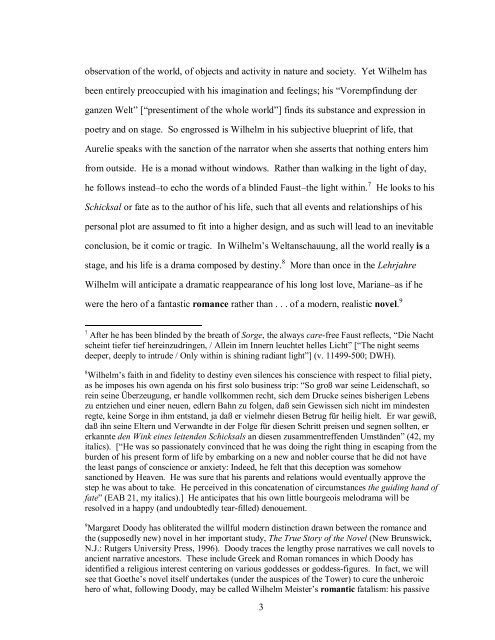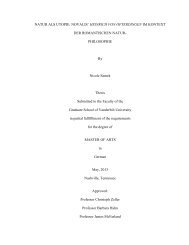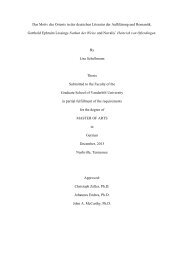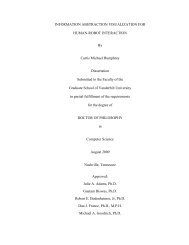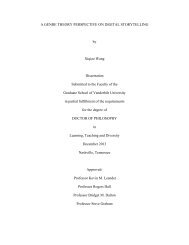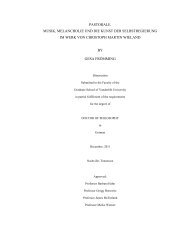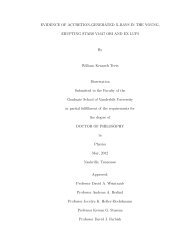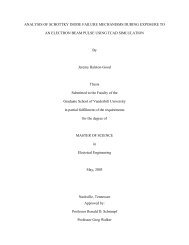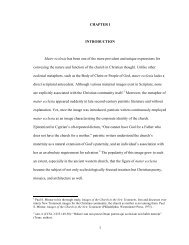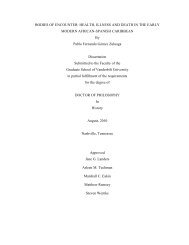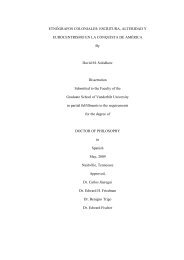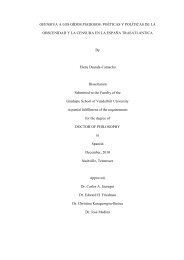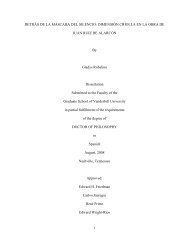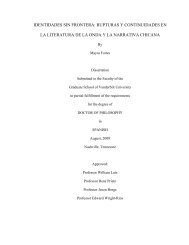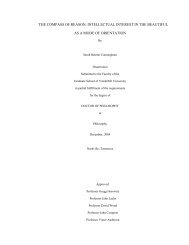THE DEATH OF DIONYSOS - ETD - Vanderbilt University
THE DEATH OF DIONYSOS - ETD - Vanderbilt University
THE DEATH OF DIONYSOS - ETD - Vanderbilt University
Create successful ePaper yourself
Turn your PDF publications into a flip-book with our unique Google optimized e-Paper software.
observation of the world, of objects and activity in nature and society. Yet Wilhelm has<br />
been entirely preoccupied with his imagination and feelings; his “Vorempfindung der<br />
ganzen Welt” [“presentiment of the whole world”] finds its substance and expression in<br />
poetry and on stage. So engrossed is Wilhelm in his subjective blueprint of life, that<br />
Aurelie speaks with the sanction of the narrator when she asserts that nothing enters him<br />
from outside. He is a monad without windows. Rather than walking in the light of day,<br />
he follows instead–to echo the words of a blinded Faust–the light within. 7 He looks to his<br />
Schicksal or fate as to the author of his life, such that all events and relationships of his<br />
personal plot are assumed to fit into a higher design, and as such will lead to an inevitable<br />
conclusion, be it comic or tragic. In Wilhelm’s Weltanschauung, all the world really is a<br />
stage, and his life is a drama composed by destiny. 8 More than once in the Lehrjahre<br />
Wilhelm will anticipate a dramatic reappearance of his long lost love, Mariane–as if he<br />
were the hero of a fantastic romance rather than . . . of a modern, realistic novel. 9<br />
7 After he has been blinded by the breath of Sorge, the always care-free Faust reflects, “Die Nacht<br />
scheint tiefer tief hereinzudringen, / Allein im Innern leuchtet helles Licht” [“The night seems<br />
deeper, deeply to intrude / Only within is shining radiant light”] (v. 11499-500; DWH).<br />
8 Wilhelm’s faith in and fidelity to destiny even silences his conscience with respect to filial piety,<br />
as he imposes his own agenda on his first solo business trip: “So groß war seine Leidenschaft, so<br />
rein seine Überzeugung, er handle vollkommen recht, sich dem Drucke seines bisherigen Lebens<br />
zu entziehen und einer neuen, edlern Bahn zu folgen, daß sein Gewissen sich nicht im mindesten<br />
regte, keine Sorge in ihm entstand, ja daß er vielmehr diesen Betrug für heilig hielt. Er war gewiß,<br />
daß ihn seine Eltern und Verwandte in der Folge für diesen Schritt preisen und segnen sollten, er<br />
erkannte den Wink eines leitenden Schicksals an diesen zusammentreffenden Umständen” (42, my<br />
italics). [“He was so passionately convinced that he was doing the right thing in escaping from the<br />
burden of his present form of life by embarking on a new and nobler course that he did not have<br />
the least pangs of conscience or anxiety: Indeed, he felt that this deception was somehow<br />
sanctioned by Heaven. He was sure that his parents and relations would eventually approve the<br />
step he was about to take. He perceived in this concatenation of circumstances the guiding hand of<br />
fate” (EAB 21, my italics).] He anticipates that his own little bourgeois melodrama will be<br />
resolved in a happy (and undoubtedly tear-filled) denouement.<br />
9 Margaret Doody has obliterated the willful modern distinction drawn between the romance and<br />
the (supposedly new) novel in her important study, The True Story of the Novel (New Brunswick,<br />
N.J.: Rutgers <strong>University</strong> Press, 1996). Doody traces the lengthy prose narratives we call novels to<br />
ancient narrative ancestors. These include Greek and Roman romances in which Doody has<br />
identified a religious interest centering on various goddesses or goddess-figures. In fact, we will<br />
see that Goethe’s novel itself undertakes (under the auspices of the Tower) to cure the unheroic<br />
hero of what, following Doody, may be called Wilhelm Meister’s romantic fatalism: his passive<br />
3


